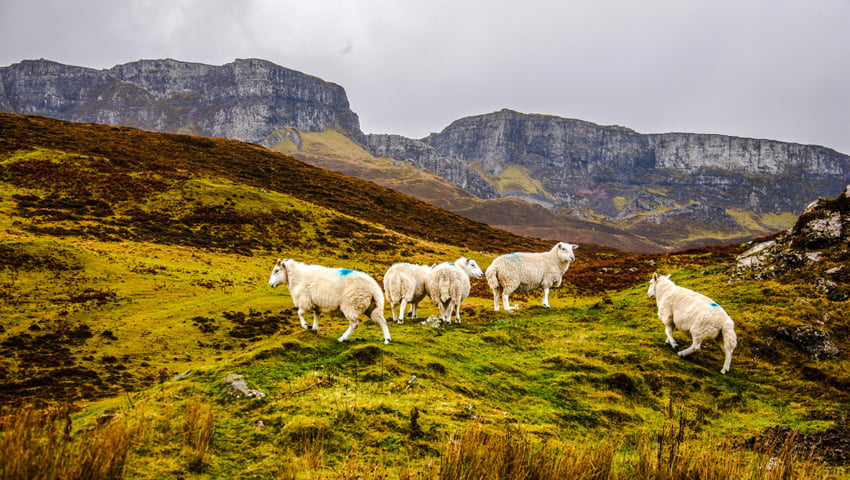David McKay, head of policy for Soil Association Scotland has said that “One of the missing elements in the political discourse around the climate and nature emergencies is a nuanced debate around dietary change.”
The Scottish Government has a legally binding target to reach net-zero emissions by 2045, while ambitious nature restoration targets are due to be enshrined in law next year.
Soil Association Scotland is clear that to meet these targets, diets will need to change – less and better meat; more and better vegetables, fruit and pulses – and they support the IDDRI and Food, Farming & Countryside Commission model. This envisages an overall reduction in meat production, but focusses primarily on intensive pork and poultry, which are heavily feed dependent.
The majority of land in Scotland is only suitable for grazing livestock, and the Soil Association supports extensive, organic and agroecological forms of ruminant production. It wants Members of the Scottish Parliament (MSPs) to recognise the benefits of ruminant agriculture from both ecological and nutritional perspectives.
However, the Committee on Climate Change recently wrote to MSPs making it clear that to meet net-zero targets, Scotland’s livestock numbers must come down. Their solution was simple – Scottish people need to eat less meat and dairy.
In his letter to the Rural Affairs Committee at Holyrood, Chris Stark, Chief Executive of the CCC, called for a 29% reduction in dairy cattle, and a 26% reduction in beef and sheep production.
“Now those are quite big numbers,” David McKay told 8.9ha TV News, “and I think the MSPs on the committee were quite taken aback by that when we have a farming system in Scotland that’s based very much on livestock production. Having said that I do think that if Scottish Government were to follow what we’re suggesting in terms of that shift to more agroecological production then there would be a reduction in the number of animals farmed.”
Mr McKay hopes that while listening to the CCC on emissions, the Scottish Government will take a broader view in terms of in-the-round delivery for people and nature.
“We’re going to have an Agriculture Bill introduced to parliament in September and the proposals thus far are a four-tier framework. Scottish Government has committed to maintaining direct payments, but 50% of that payment will be contingent on what that farmer or land-owner does to reduce emissions and to improve biodiversity. I think there is an understanding in Scottish Government of a whole farm approach to this, recognising that it’s not just about carbon, it’s not just about methane.”
The Scottish Government’s Future Support Framework proposes conditional payments under four tiers. Tiers 1 and 2 would be direct payments, while tiers 3 and 4 would be indirect payments.
- Tier 1 is a ‘Base Level Direct Payment’ to support active farming, with conditionality based on climate and biodiversity outcomes.
- Tier 2 is an ‘Enhanced Level Direct Payment’ to reward land-based businesses that are highly effective in reducing greenhouse gases and restoring nature.
- Tier 3 is an ‘Elective Payment’ to support targeted actions based around nature restoration and supply chain innovation.
- Tier 4 is ‘Complementary Support’ to help build knowledge and training.
Mr McKay is clear that meeting the Scottish Government targets will be an immense challenge. “We have a net zero target for 2045, which is five years earlier than the rest of the UK – we also have an interim emissions reduction target of 31% that needs to happen from agriculture by 2032. So, in the next 7 years we have to reduce emissions by almost a third and on recent history that’s going to be extremely difficult.”
The current levels of polarisation in discussions about the future of agricultural land use make matters additionally complicated.
Mr McKay said “It’s essential that we find a way to have this debate in a more constructive fashion. We’ve all seen how polarized this discussion has become. In Scotland, Edinburgh City Council recently endorsed a Plant-Based Treaty. This doesn’t commit the City to doing very much, but the backlash was enormous. We’ve had similar stories from university campuses where students have tried to reduce the meat from the menus in canteens.
“Where we need to get to – and this is something we do at the Soil Association in the conversations we have with industry, with government and with other NGOs – is to try and find areas that we can agree.
“We all accept that the Scottish Government has set these targets. We all accept that there is a climate and nature emergency, and that the status quo isn’t going to cut it going forward. That’s a starting point where we can start to have a constructive discussion about how we get there.”
